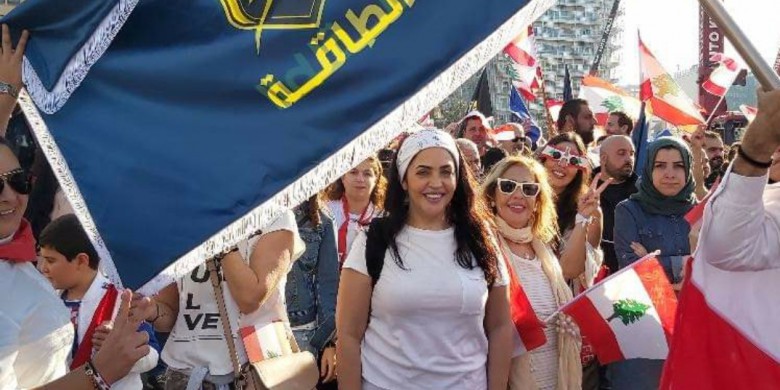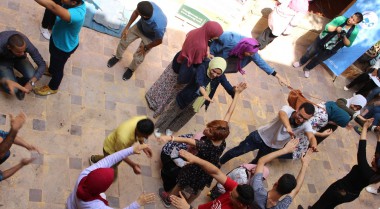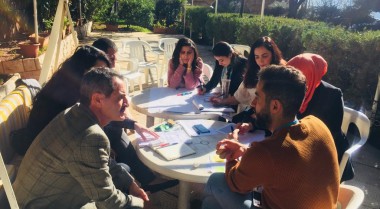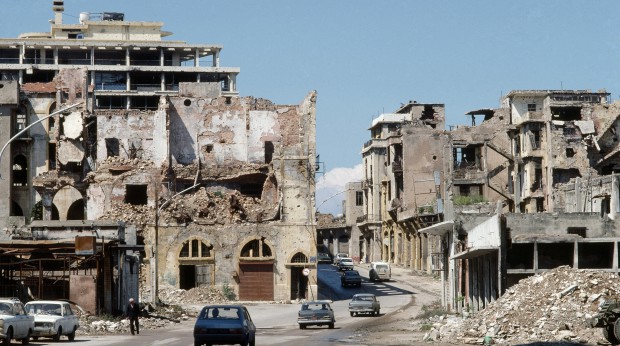
Lebanon: No Justice, No Peace
Billowing smoke encompassed the port of Beirut on the 4th August 2020. A fire in warehouse 9, erupted into a giant explosion. Several smaller explosions were followed and then around 30 seconds later, the largest of all was felt, culminating in a giant mushroom cloud. A blastwave radiated throughout the city, wreaking devastation in its path.
Moments after, firemen were called to the location without any warning of the known 2,750 tonnes of ammonium nitrate located in the neighbouring warehouse, number 12. So far none of the firemen have been found alive. The BBC reported that over 200 people have been killed, 6,000 injured, 300,000 are homeless and many have gone missing. The mismanagement and negligence of the situation has sent an already vulnerable country further into crisis.
The underlying frustration towards the government’s corruption and negligence is something the people of Lebanon have felt for a long time.
Long-term GPPAC member and Lebanese peacebuilder Shirine Jurdi took the time to discuss the most recent events, giving a voice and a platform to those in Lebanon finding themselves most in need. Despite the tragedy and anger, she highlights solidarity and unity shown in this time. For her and her country, this disaster is part of the tragic reality faced under their past string of corrupt and unaccountable governments and the lack of global commitment to prevention and peacebuilding.
The Final Straw
Up until last Tuesday, Lebanon was facing the challenges of the aftermath of 15 years of civil war (1975 - 1990), decades of corruption, financial crisis, and of course, the COVID-19 pandemic. On the 4th of August 2020, these overwhelming daily struggles seemed insignificant in comparison to the new crisis Lebanon faced. The country was shocked to its core by the explosion of a warehouse holding over 2,750 tonnes of ammonium nitrate. The blast was heard in Cyprus, 200 kilometers away. The BBC compared the force to the equivalent of a 3.3 magnitude earthquake.
Most shocking of all was the revelation that this substance was known by officials to be located in the warehouse for 6 years prior to the incident. The government was even warned on the 22nd July of the potential flammatory and explosive nature of the product. A moment that really should have triggered collective and prompt action to prevent such a catastrophe as that which occurred on the 4th August.
Whilst international assistance and NGO support has been vital in the days following 4th August, this event really highlights the importance of a preventative approach to security and peace.
The intensity of this disaster has gained international attention; yet the discourse has been primarily humanitarian. But the underlying frustration towards the government’s corruption and negligence is something the people of Lebanon have felt for a long time. Immediately after the events, the government came under extreme pressure from revolutionaries, who demanded the government, president and parliament to step down.
On the 10th August, Prime Minister Hassan Diab announced his resignation, describing the explosion as a “crime” that was a result of corruption “bigger than this state”. Revolutionaries -or as they like to be called: the ‘thuwar’- see this move as a win. However, his statement of stepping back to stand together with the people of Lebanon has not been viewed as genuine.

Prevention not Response
Whilst international assistance and NGO support has been vital in the days following 4th August, this event really highlights the importance of a preventative approach to security and peace. As stated by the UN Secretary General in his January 2020 speech,” prevention must orient all we do as we engage across the peace continuum”.
The events occuring in Lebanon right now signify the lack of ongoing prioritisation of prevention and peacebuilding. This greatly contrasts with the milestones that will be celebrated on the UN 75th Anniversary, the Peacebuilding Architecture Review, the anniversaries of the Women, Peace and Security and Youth, Peace and Security Agendas-- all of which have prevention at their very core.
In keeping with the UN statement, the people of Lebanon are looking not just for accountability for the explosion, but ongoing focus on peacebuilding and prevention in the future. Prevention of any further disasters, corruption and mismanagement.
Hope in Times of Darkness
With the explosion occurring just a few days before the 75th anniversary of the Hiroshima bombings, it is impossible not to make the connection between such dramatic events. The mushroom cloud that had once descended upon Japan, was now doing so across Beirut.
Having visited the Hiroshima museum herself, Shirine found the comparison particularly poignant. At the end of the museum, there is a picture of a green leaf which grows, despite all of the destruction. Shirine believes “despite everything, life will go on” and the same applies for Lebanon.
Despite the remarkable resilience of Lebanese people, when faced with economic, social, health and environmental insecurities, many are starting to doubt how much more they can endure. With a passionate voice Shirine said:
“The people of Lebanon just want to live normal lives, where they are able to hope and dream again. They are not going to continue waiting on another disaster. The time is now for the people to unite for security, peace and justice”



